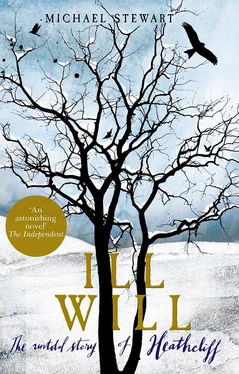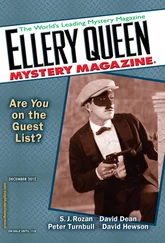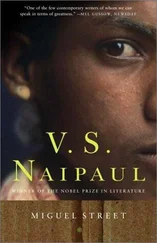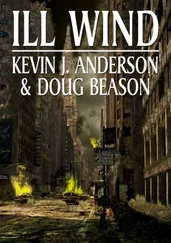The other workers began and ended each day by thanking God, but I would do no such thing. And so this became my routine for the next few weeks. The work was hard but I grew strong and my thoughts turned again to my plan. I now had two pounds. I was halfway there. Perhaps in Manchester I could set myself up and be my own master. Every night I would wander to the hollow and count my pennies. Once I had counted them, I would pile them all carefully back into the bag and hide it in the hollow as a squirrel does an acorn. It was a disturbed night in the barn with the other labourers, as some of them snored or else talked in their sleep. When slumber did visit me I dreamed about you. Sometimes I would wake with you on top of me, but when I reached out to touch your skin you turned into air. In another dream, I came into your chamber and you were there in bed with Edgar and he was leering at me. Other times I’d dream I was with Hindley, with my hands around his throat, squeezing the life out of him, and I would wake with a jolt and the disappointment of an empty grasp.
I would lie on my back, trying to block out noxious smells and the noisy racket, filling my head with plans of revenge. Yes, I would make my fortune in Manchester or Liverpool, but at some point in the future, I intended to return to you, an improved gentleman. I remembered the adage of the hare and the tortoise. I would take my time. I would savour my vengeance. I would linger as it lied.
With this in mind, one day I got into conversation with Sticks and asked him what I could do to improve my situation.
‘You need to read and write, laa.’
‘I know my alphabet,’ I said.
‘That’s a start. But you look around you at those who can read and write and those that can’t. Every labourer here is illiterate, me excepted. Do you think the squire is illiterate? Do you think the parson is? Or the doctor or the lawyer or the judge?’
‘So why do you choose the life of a farm labourer if you can read and write?’
‘Like I’ve said to you before, laa. There’s them that’s running to something, and them that’s running away.’
‘Which one are you?’
‘No matter, laa, no matter. Look, you want to improve your station in life then you start with your letters and your words. Everything comes from that.’
Sticks was right: if I were to gain dominion over Hindley’s mind and over his estate, and also gain your true respect and be a worthy adversary to Edgar, I would have to go beyond the rudimentary lessons you taught.
‘So how would I go about it then?’ I said.
‘I tell you what, laa, there’s a Sunday school that’s been set up in the village by the Methodists there. Been going a few years now, and it’s not just for bairns.’
Sure enough, when I went into the village the following Sunday I was informed that there was indeed a school for youths of both sexes, from fourteen to twenty-one years of age, and that it was in a commodious room at number four Sheppard Street. I attended one of the sessions. There were about twenty pupils sitting on the floor as there were no chairs. Most of them looked to be farm labourers. The teacher was a Methodist called George, simply dressed in black with a white silk scarf. His skin was pale and his hair was short and parted on one side. He copied out some passage from the bible in neat handwriting, using chalk and a slate, and said it was our duty to learn to read it for ourselves. He turned to us and picked up a bible. He held it aloft.
‘God gave you eyes and a brain. This book is not just for priests and nobility, it is for you and your kin, and it’s your duty to read the truth within.’
He called us ‘children of wrath’. He chalked up the letters of the alphabet on the board and we had to join in as he sang them out. It was a joyless and repetitive experience. I tallied that the classroom was not for me. I tried to take instruction but something in my head resisted. I was familiar with the alphabet in any case and would as much be able to self-learn given a book or two and some time. I went on three or four separate occasions and was by then further on with my learning but not sufficient as I’d hoped. When George was taken up with tutoring one morning, I took hold of one of the bibles in the room and secreted it inside my surtout. I knew its stories well from Joseph’s sermons, and figured this would help me to sightread. I waited for the lesson to come to an end, then walked out of the school bidding George good day and saying that I would see him the following Sunday, even though I had no intention of going to the school ever again.
So, the next Sunday, after telling the farmer and his wife that I was off to school, I walked up and onto the moor and, after some searching, I found a shallow cave where I could self-school. It was a good spot, a long way from any path, and well hidden. I spent every spare hour I had there. When the workers were playing cards and drinking ale, I would sit with my book. I brought blankets and made the space comfortable. I found a flint and steel in one of the barns, collected kindling and wood, filched a few flaights from the lower barn, and there I’d stay, with a fire to keep me warm, nicely sheltered. Once or twice I even spent the night there, waking at dawn and sneaking back into the barn while the others were still sleeping, joining the rest of the labourers without anyone the wiser. But mostly I studied. It was hard-going to begin with. I opened the book on the first page and commenced my learning. The first word was easy. I knew the sound of ‘I’ and ‘n’ and could put them together. ‘The’ I also knew. The third word was my first challenge, but by saying it aloud in stages, I got there. First ‘beg’ then ‘inn’ then ‘ing’: ‘beginning’. Many hours those first few pages took me and I was glad I had no company to hear my clumsy efforts. A Hindley or a Joseph would soon have made me regret my efforts, sure enough.
It was all God said this and God said that. And God made this and God made that. I always liked the story of the Garden of Eden. And I was pleased when I got that far. The story was familiar to me but it was good to reacquaint myself with its lesson. Though it was not the orthodox one. God lied to Adam and Eve. He said that if they ate the forbidden fruit then they would die. But the fruit was not poisonous and they did not die. In any case, God had made the tree and made the fruit. Then the serpent came along and talked to Eve. But the serpent did not lie because he said that if they ate the fruit they would know good and evil and the snake was right. They did learn good and evil when they ate the fruit. God lied. The devil told the truth. When they were cast out of Eden, I thought that this was for the best. Who would want to stay in Eden under the authority of a tyrant? I was on the side of the snake. For wasn’t the snake also a child of heaven?
I recalled that day when we clambered down Duke Top, through the wooded clough past Cold Knoll, resting in the heather near Lower Slack.
‘What’s that?’ you whispered.
I didn’t see it at first, so well hidden was it in the undergrowth, but as my eyes adjusted, I saw it, a viper’s nest, the mother with her babies underneath her belly. They were all curled around each other for warmth. The mother bobbed her head and flicked her tongue. She saw us watching her and coiled protectively around her brood. We sat and watched, as stiff as rocks, not wanting to disturb the scene. We hardly even dared to breathe. At last we crept away, leaving them alone again. There was something majestic about that creature and we had both been bewitched by her finery.
And I read of Cain and Abel, of Cain slaying Abel, and I realised that Cain had acted in haste and could have punished his brother much worse by not killing him. In this way Abel escaped his true punishment. I was determined that Hindley would not escape his. On I read, it getting easier verse by verse and chapter by chapter. So that by the time I got to Exodus my reading was accomplished. I read all the culinary advice God offered Moses. I read the Lord’s commandments and vowed to disobey them all: I would steal, I would bear false witness, I would covet my neighbour’s oxen, and I would kill if I felt like it. But better to kill a man’s spirit, to crush it entirely, while saving his flesh for the devil.
Читать дальше












